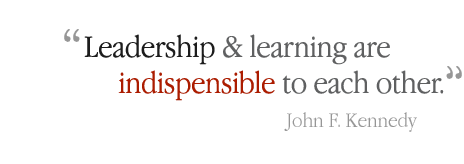
Administrative
Leadership
Every school community has a unique mission, vision, and core values that are embedded in their history, present needs, and future goals. Similarly, every building leader is also different in their leadership style and theory. The internship process gave me opportunities to discover my innate leadership style, build upon it through experiences and skill development, and learn how to reflect and improve it while taking on leadership roles. In particular, the following experiences developed communication skills, improved on collaboration, and allowed me to highlight my positive, open, and caring nature.

“A leader is one who knows the way, goes the way, and shows the way." John C. Maxwell
District Leadership Team
Site Council
Meetings: School Board, Administrative, and Faculty
Because of the size of the district and the mere fact that it is a K-12 building, the Building Leadership Team is essentially the District Leadership Team as well. The members consist of district and building administrators, school social worker, school psychologist, test coordinator/computer teacher, special service teacher, and teacher representatives from each level (primary/intermediate/upper). This particular team formed as a result of the school improvement process and MTSS training in 2008. We meet once a quarter to develop and promote the school mission, plan and carry out the district goals by setting up timelines and accountability measures, and review and revise the school vision through collaborative discussions and decision-making. These measures are all done through careful reflection using state and federal mandates, community surveys, student assessment and behavioral data, staff input, and focused on building/district goals. Another important task this team works on are documents that inform all stakeholders: state/federal entities, district/building staff, community, parents, students, and school board members. Some important skills I have developed through the District Leadership Team over the years are:
-
Positive and healthy discourse is a result of careful and planned meeting expectations that are agreed upon and carried out at every gathering.
-
Effective procedures and actions stem from clear and concise expectations; what is to happen, when, where, by whom, etc.
-
When students' success is the first and foremost goal, many of the once thought of "problems" become minimal or unimportant.
Some future ideas that I might consider are the following:
-
Team Membership - Including community members and parents would bring perspective and relational trust that is not currently a strong characteristic in our district. Because of the confidential nature of some of the material, this would need to be carefully monitored. Presently, membership does not change unless a member leaves the district. This is advantageous for training purposes, consistency, and relational trust. On the other hand, does that practice allow for new and interested leaders to grow within our district? Are we modeling and practicing the team spirit that we hope aspire throughout our school culture?
-
Communication/Meeting Minutes - Although the team does a great job of communicating with specific people and groups affected by decision-making, the general process and procedures that take place during the meetings are not shared with the staff. I believe doing so would provide them with valuable information and further encourage involvement. Team members and administrators should be prepared for communication and push back that may occur as a result.
Site Council Agenda
Tribal Leadership is a excellent resource for any future leader. It defines the five stages of "tribes" in any organization, how leaders can identify the tribe's core values, assets, and behaviors. In doing so, an effective leader will then use the guiding principles and strategies to organize, motivate, and strengthen the tribe. This book has become an essential part of my leadership toolbox!

Book Study: Tribal Leadership
The Mission Valley Site Council includes school and community members that discuss and oversee district and school decisions each quarter. I have been a member of this council for many years and have gained a tremendous wealth of knowledge and skills. Reflections include:
-
Parents and community members care deeply about the students, staff, school, and their community. Just because they may not always appear present, as an administrator and staff, we should not assume they aren't interested!
-
Administrators and staff need to be conscious that we are communicating often, in various ways, and in a language all stakeholders understand. Sometimes we get caught up in our school jargon and forget those acronyms and terms may not make sense to everyone involved.
-
The success of any school is a journey of the many people working together, common goals and purpose, and constantly learning from our mistakes.
It's no secret that a significant amount of an administrators time is spent in meetings. Meetings provide a common place to inform, discuss, and make important decisions concerning the students, staff, and schools. Because so much of a building leader's time is allotted to this task, it's important to make sure it is well spent.
-
Stick to the Agenda - When discussions get off task; time gets away. When other important items get brought up, acknowledge their importance and revisit them in another setting.
-
Meetings should be timed according to the set goal. If you want face-to-face announcements, keep it short and to the point. If it's an in-depth discussion, provide intermediate tasks and plenty of time to work through the process.
-
Just like good teaching, participants should be focused and engaged.
-
Remember the Basics - Start on time, be prepared, provide necessary materials, communicate clearly, and stop on time.
BOE Meeting
Minutes
Faculty Meeting
